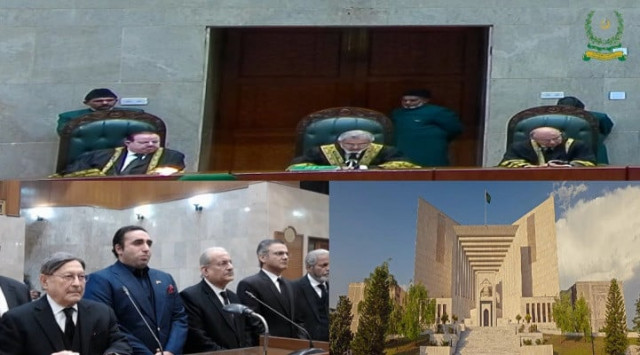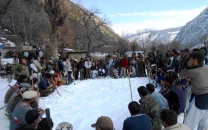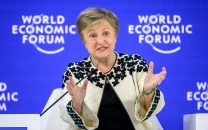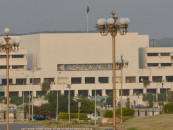SC admits Bhutto’s unfair trial after 44 years
Nine-member bench unveils its brief opinion on a presidential reference filed over a decade back

The Supreme Court admitted on Wednesday that former prime minister Zulfikar Ali Bhutto was not given the right to a fair trial, almost 44 years after the founding chairman of the Pakistan Peoples Party (PPP) was hanged in a murder case.
A nine-member larger bench of the apex, led by Chief Justice Qazi Faez Isa, announced its opinion on a presidential reference filed by former president Asif Ali Zardari more than a decade ago. The announcement was also broadcast live on the YouTube channel of the Supreme Court.
The chief justice announced the court’s reserved written order, which said Bhutto's trial in the Lahore High Court (LHC) and then in the Supreme Court was not conducted in accordance with the fundamental rights and fair trial provided by the Constitution.
The larger bench included Justice Sardar Tariq Masood, Justice Mansoor Ali Shah, Justice Yahya Afridi, Justice Aminuddin Khan, Justice Jamal Khan Mandokhail, Justice Muhammad Ali Mazhar, Justice Hasan Azhar Rizvi and Justice Musarrat Hilali.
“The good thing is that the opinion on the presidential reference is unanimous,” Chief Justice Isa said before announcing the opinion. “We cannot move forward without correcting ourselves until we acknowledge the mistakes of the past,” he said, while announcing the court’s opinion.
Late Bhutto was convicted in the murder case of Muhammad Khan Kasuri by the LHC, over a year after the toppling of his government on July 5, 1977 by military dictator Gen Ziaul Haq. Later, Bhutto’s appeal against his conviction was rejected by the Supreme Court through a 4-3 split verdict.
The PPP always contended that the party founder and the country’s first elected prime minister was falsely convicted and hanged. During the PPP government from 2008-13, the then president sent a reference to the apex court to review the case and acquit Bhutto.
The chief justice noted that the reference was filed during the PPP government but it was not withdrawn by the subsequent governments. He added that not withdrawing the reference reflected the collective will of the people of Pakistan.
The reference put up five questions. In the brief written opinion, the Supreme Court did not answer the second and fourth questions. The court gave its opinion on three questions.
To the first question, whether the LHC and the Supreme Court decision met the requirements of fundamental rights, the bench said that the proceedings did not meet the requirements of the fundamental right to a fair trial and due process enshrined in Articles 4 and 9 of the Constitution.
However, the court noted that the Constitution and the law did not provide a mechanism to set aside the judgment of Bhutto’s conviction and sentence; therefore, the judgment attained finality after the dismissal of the review petition by the apex court.
On the second question, whether the decision of the Supreme Court was binding on all other courts, the court opined that it could not be answered whether any principle of law enunciated in the Bhutto case had already been dissented to or overruled.
Read SC debates martial law, pressure, procedural doubts in Bhutto case
On the questions 3 and 5, whether in the death sentence was justified or it could amount to deliberate murder of the late Bhutto, the bench opined that in its advisory jurisdiction, the court could not reappraise the evidence and undo the decision of the case.
On the question 4, whether the Bhutto case decision fulfilled the requirements of Islamic laws, the bench opined that the court was not “rendered any assistance on this question, therefore, it would be inappropriate to render an opinion.”
The chief justice emphasised that it was the constitutional responsibility of the judges to fulfil their responsibilities in accordance with the Constitution. As a judge, he added, the decisions should be made according to the law without any fear, temptation or attachment.
He said there were some cases in the judicial history, which shaped public opinion that the judiciary succumbed to intimidation or temptation, while fulfilling its responsibilities. “We have to hold ourselves accountable by openly admitting our past mistakes,” he added.
The Supreme Court would issue the detailed opinion, later.
“We will point out the constitutional and legal flaws in the trial and legal procedure in the Zalfikar Ali Bhutto trial in a detailed opinion,” the chief justice observed.
Bhutto’s grandson and PPP Chairman Bilawal Bhutto Zardari termed the Supreme Court’s opinion “historic” and expressed the hope that it would help the country progress on all fronts. “It was difficult for ordinary people to trust the judicial system when a popular leader like Bhutto couldn’t get justice.”
In a post on X, Bilawal said the SC’s opinion came “44 years after judicial murder and more than 12 years after [the] presidential reference was filed”.
He added: “The pursuit of justice was a labour of love by (former) President Asif Ali Zardari in the name of his wife Shaheed Mohtarma Benazir Bhutto. Our family waited 3 generations to hear these words.”
(WITH INPUT FROM APP)



















COMMENTS
Comments are moderated and generally will be posted if they are on-topic and not abusive.
For more information, please see our Comments FAQ